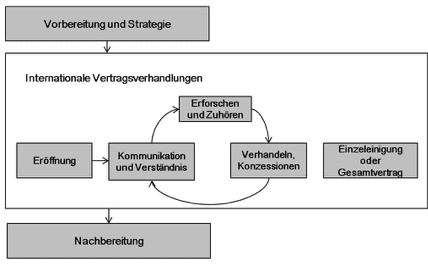Im Rahmen unserer Serie über international relevante Themen von unserem Autor Sergey Frank widmen wir der äußerst wichtigen Frage, wie man im Einzelnen eine erfolgreiche Verhandlung auf internationalem Parkett führt, einen 3-teiligen Artikel.
Verhandlungen spielen in jedem Geschäft, natürlich auch auf internationaler Ebene, eine bedeutende Rolle und laufen selten einheitlich ab. International kommt es häufig zu komplexen Situationen, zum Beispiel aufgrund eines unterschiedlichen Sprachniveaus der Verhandlungsparteien oder divergierender Kultur- und Wertanschauungen. Gespräche erfolgen meist auf Englisch oder in Drittsprachen, häufig unter Zuhilfenahme von Dolmetschern, wie zuvor bereits beschrieben. Hinzu kommen voneinander abweichende Prioritäten und Zeitvorstellungen.
Diese Aspekte sind komplex und bergen erhebliche Risiken, die in Missverständnissen, Zeitverlust und Frustration enden können. Um dies zu verhindern und gleichzeitig die Kommunikation und das Verständnis der Verhandlungspartner zueinander zu verbessern, gilt es, bestimmte Spielregeln zu beachten.
Zu diesen Spielregeln gehört ein klarer Verhandlungsablauf in vier Schritten: Eröffnung und Festlegung der wesentlichen Meilensteine (Teil 1), Kommunikation und das Erforschen der Interessen der Gegenseite (Teil 2), das eigentliche Verhandeln (Teil 3) sowie Einigung und idealerweise Vertragsabschluss (Teil 4). Das Ergebnis einer Verhandlung kann zunächst nur eine Teileinigung sein, bevor in einer weiteren Runde die weiteren Themen verhandelt werden. Und auch der Prozess der Verständigung, des Zuhörens und des Verhandelns kann sich mehrfach wiederholen. Gerade in personenorientierten Kulturen wie etwa im Mittleren Osten, in Asien oder auch Russland können sich Verhandlungsgespräche über einen längeren Zeitraum hinziehen.
In vielen Ländern ist die persönliche Ebene vielleicht sogar noch wichtiger als die Sachebene. Um ernsthafte Konflikte zu vermeiden, gilt es daher, beide Ebenen voneinander zu trennen. Oftmals wird der Partner nicht als Repräsentant eines Unternehmens, sondern als Mensch gesehen. So kann Unmut über eine unangenehme Situation dazu verleiten, diesen Ärger am Gegenüber auszulassen. Um dies zu vermeiden, sollte man besser Beziehungselemente wie Verständnis, Respekt, Zuneigung, Angst und Ärger einerseits und Sachelemente wie Preise, Spezifikationen, Wettbewerbsvorteile, Zahlungs- und Lieferbedingungen andererseits genau voneinander trennen. Man kann seine Interessen immer konsistent verhandeln, aber gleichzeitig auch höflich mit dem Partner umgehen.
Das Ziel
Persönliche Wertschätzung und Integrität sind wesentliche Bestandteile jeder Geschäftsbeziehung, ob national oder international. Es ist in diesem Zusammenhang unmöglich, ein Patentrezept für erfolgreiches Verhandeln auf internationaler Ebene zu liefern. Ferner ist es nicht die Absicht, rhetorische Tricks zu vermitteln, mit denen die andere Partei möglicherweise „hereingelegt“ oder „über den Tisch gezogen“ wird. Im Folgenden geht es um bewusstes Verhandeln, d. h. wie man sachbezogen, rationell und strukturell agiert. Es liegt im vordergründigen Interesse des Verhandlers
- effektiv und professionell zu verhandeln
- ineffektive Konflikte zu vermeiden
- so schnell wie möglich angemessene Ergebnisse zu erzielen
- Verbindlichkeit auch im interkulturellen Kontext zu erreichen.
Nach einer gründlichen Vorbereitung einschließlich einer eindeutigen Zieldefinition dessen, was man will, können die eigentlichen Verhandlungen beginnen. Grundsätzlich verlaufen Verhandlungen nach dem in der nachfolgenden Abbildung gezeigten Schema, wobei sich der Prozess der Verständigung, des Zuhörens und des Verhandelns mehrfach wiederholen kann. Oft kommt man in Form von Teileinigungen zum finalen Vertrag.

Obige Abbildung zeigt ganz deutlich die Gesamtkonstellation und auch die Dynamik der Vertragsverhandlungen. Im Prinzip basieren diese auf einer guten Verhandlungsvorbereitung, dem Erreichen von Teilvereinbarungen und im Anschluss daran auf einer Fortführung der Verhandlungen. Schlussendlich kommt man (oder eben auch nicht) zum Gesamtvertragsabschluss.
Es bietet sich an, folgende Überlegungen zu den einzelnen Schritten anzustellen:
Die Vorbereitung
Bevor es zu den eigentlichen Verhandlungen kommt, sollte man versuchen, sich auf den jeweiligen Partner einzustellen. Je mehr man über ihn weiß, sowohl geschäftlich als auch persönlich, desto besser. Daher ist es am Anfang einer Verhandlung sehr wichtig, ein positives Klima zu schaffen.
Höflichkeit und Gastfreundschaft verstehen sich in diesem Zusammenhang von selbst. Hinzu kommen das Interesse an der Person des Partners, eine offene Kommunikation, freundlicher Blickkontakt und nicht zuletzt Humor. Daneben spielen bei internationalen Verhandlungen die nationalen Gepflogenheiten eine sehr große Rolle.
Es empfiehlt sich grundsätzlich, genügend Zeitreserven zum Verhandeln einzuplanen. Unter Zeitdruck ergeben sich sehr viele negative Ergebnisse. Der Mangel an Zeit wird oft zum Druckmittel, insbesondere bei internationalen Verhandlungen.
Wer im Voraus präzise sein jeweiliges Thema für eine Verhandlung bestimmt, kann davon ausgehen, dass die Verhandlung planmäßig abläuft und nicht ausufert. Dafür bietet sich etwa eine Gliederung in Hauptthema, Nebenthemen, Haupt- und Nebenargumente an. Ein zunächst komplex erscheinender Sachverhalt wird dadurch strukturiert und verständlich und zwar sowohl in sich selbst als auch für den Partner. Folgende Punkte sind zu beachten:
- Agenda – strukturieren Sie das Verhandlungsthema
- Definition von Schlüsselbegriffen, denn häufig kommt es, idealerweise gemeinsam mit der anderen Seite, auf die genaue Begriffsbestimmung an
- Entwicklung einer Verhandlungsstrategie und Vorbereitung auf die eigenen Ziele, aber auch Reflexion von Prioritäten der anderen Seite
- Flexibilität – Suche nach Optionen und Überdenken möglicher Eingeständnisse
- Ein Schritt-für-Schritt-Ansatz – Vom Kleineren zum Größeren im Rahmen des Verhandlungsverlaufs
Die Argumentation
Neben persönlichen Aspekten ist auch das verfahrensmäßige Vorgehen relevant und eine klare Gesprächsgliederung unabdingbar. Hinsichtlich der Argumentation sollte man darauf achten, die Verhandlung nicht zu kalt und zu nüchtern zu beginnen. Diese Form des Verhandelns mit hohen Anfangspositionen und negativen Festlegungen wie „bis hierhin und nicht weiter“ wird in vielen Ländern als deutlich zu fordernd angesehen. Man riskiert zudem, sein Gesicht zu verlieren, wenn man im Verlauf der Gespräche in seinen Erwartungen nachgibt.
Es ist also wichtig, nicht von vornherein zu hohe, sondern vielmehr angemessene, Positionen aufzubauen. Faktoren wie Gesichtswahrung und Interesse an der Kultur und Persönlichkeit des anderen sind generell von großer Bedeutung. Verhandeln Sie daher weniger über Positionen als vielmehr über vorgelagerte Interessen. Wem es gelingt, die Position der Gegenpartei erfolgreich zusammenzufassen und dann seinen eigenen Standpunkt zu erläutern, der verbessert seine eigenen Erfolgschancen wesentlich.
Eine klare und damit konsistente Argumentation sollte gut vorbereitet sein. Die Vorbereitung dazu nimmt meistens einige Zeit in Anspruch. Hier empfiehlt es sich, den eigenen Standpunkt und eventuelle Veränderungen davon auf ihre Schlüssigkeit zu überprüfen. Zugleich sollten im Voraus möglichst viele Optionen für das Verhandlungsziel und für die -strategie entwickelt werden.
Nicht minder wichtig ist es, Einwendungen der anderen Partei, soweit sie vorhersehbar sind, zu berücksichtigen, um schnell und angemessen darauf reagieren zu können.
In der Realität mangelt es oft, insbesondere aus Zeitgründen, an einer derartigen Vorbereitung. Die Parteien gehen meistens wenig vorbereitet und mit einer, ihrer Meinung nach richtigen und damit unfehlbaren Lösung in die Verhandlung; Konflikte sind dann vorprogrammiert.
Bitte bedenken Sie: In wenigen anderen Bereichen kann so schnell so viel gewonnen aber auch verloren werden wie in internationalen Verhandlungen. Im nächsten Teil werden wir uns der richtigen Gliederung widmen und aufzeigen, wie hilfreich ein Perspektivwechsel hierbei sein kann.
Zum Artikel Spielregeln für eine internationale Verhandlungsführung (Teil 2)
Zum Artikel Spielregeln für eine internationale Verhandlungsführung (Teil 3)




